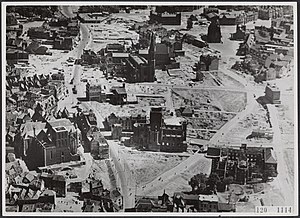Bombing of Nijmegen
| Bombing of Nijmegen | |||||||
|---|---|---|---|---|---|---|---|
| Part of World War II Operation Argument (Big Week) |
|||||||
 Police photo from 1945: in the foreground, parts of the centre mainly bombed in February '44; most buildings in the background were not destroyed until Operation Market Garden (September 1944). |
|||||||
|
|||||||
| Belligerents | |||||||
|
|
|
||||||
| Commanders and leaders | |||||||
|
(formation leader) |
(commander Netherlands) |
||||||
| Strength | |||||||
| 14 B-24 Liberators | Flaks | ||||||
| Casualties and losses | |||||||
| None | Railway station heavily damaged | ||||||
| c. 800 civilian casualties | |||||||
The Bombing of Nijmegen (22 February 1944) was an unplanned aerial bombing raid by the United States Army Air Forces on the city of Nijmegen in the Netherlands, then occupied by Nazi Germany. In terms of the number of victims, it was one of the largest bombardments of a Dutch city during World War II. Officially, nearly 800 people (almost all of them civilians) were killed by accident due to careless bombing, but because people that were in hiding could not be counted, the actual death toll is probably higher. A large part of the historic city centre was destroyed, including Saint Steven's Church; Saint Augustine's Church and Nijmegen railway station (the intended target) were heavily damaged as well.
Because the Dutch government-in-exile in London, which was able to reestablish itself on the continent in early 1945 thanks to the U.S. Army and other Allies' military efforts, tried to avoid criticism against the countries it was relying on for its liberation and future security, it and local authorities largely remained silent on the misfortunate events for decades after, leaving survivors with unaddressed grief and questions, and allowing wild conspiracy theories to thrive. Alhtough officials long maintained it had been an 'erroneous bombardment', as if Nijmegen was the wrong target, historical research has shown that the attack was definitely intentional, but had been executed terribly.
The planned raid was part of the so-called 'Big Week' (official name: Operation Argument), a series of Allied bombardments on German aircraft factories to considerably weaken the Luftwaffe in preparation of D-Day (June 1944). On 20 and 21 February, the first bombings had been carried out.
...
Wikipedia
